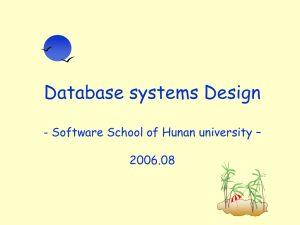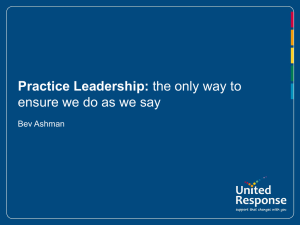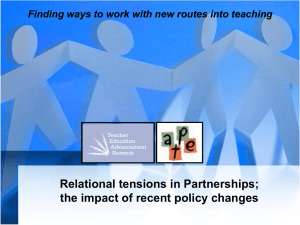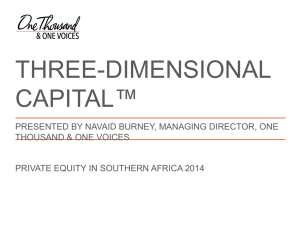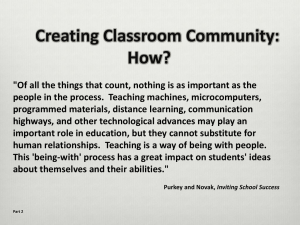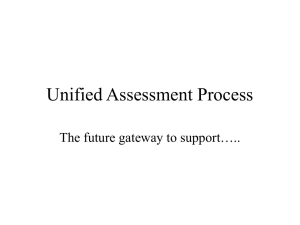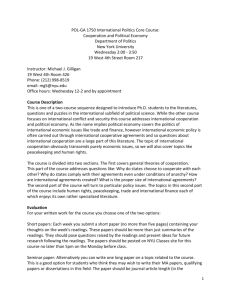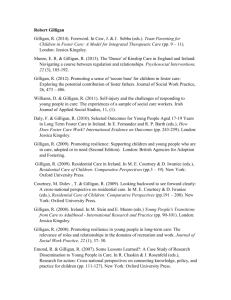Reading 1 - Plymouth
advertisement
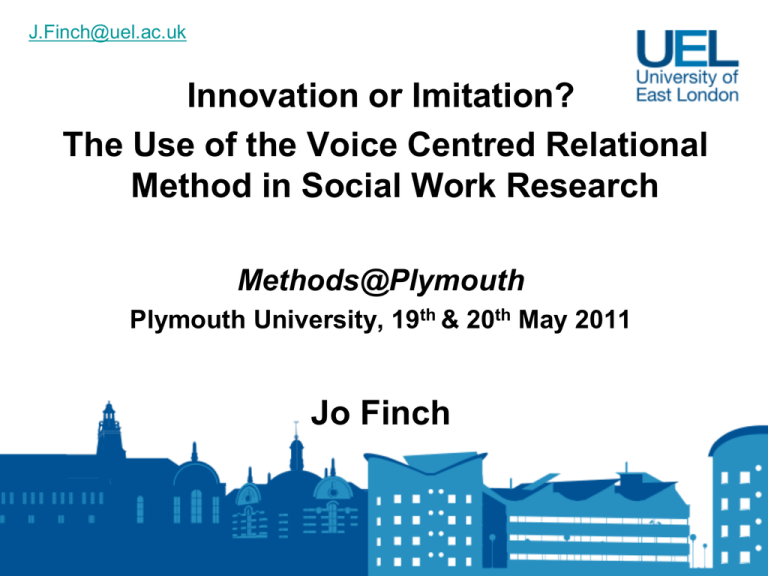
J.Finch@uel.ac.uk Innovation or Imitation? The Use of the Voice Centred Relational Method in Social Work Research Methods@Plymouth Plymouth University, 19th & 20th May 2011 Jo Finch J.Finch@uel.ac.uk Innovation or Imitation? Overview of Presentation • • • • Professional Context Research Undertaken Context of Social Work Research Voice Centred Relational Method (also known as The Listening Guide) • Imitation or Innovation? • A method for innovative qualitative social work research? • Concluding Comments Professional Context • Senior Lecturer in Social Work (UEL) • Associate Lecturer in Social Work (University of Sussex) • Freelance practice educator • Former children and families social worker and play therapist Research Undertaken - Professional Doctorate in Social Work (University of Sussex) completed in 2010 • Highly Qualitative Can’t Fail, Won’t Fail – Why Practice Assessors Find it Difficult to Fail Social Work Students. A Qualitative Study of Practice Assessors' Experiences of Assessing Marginal or Failing Social Work Students. http://eprints.sussex.ac.uk/2370/ • Utilised practitioner-research, narrative and life story and ethnographic approaches in its design •Data analysed using the Voice Centred Relational method. •Interviewed 20 practice educators who had worked with a struggling or failing student Context of Social Work Research Lack of Capacity Furlong & Oancea, 2005 Participation, & impact Sharland, 2009 Need for interstitial research Powell, 2002 Lack of distinct disciplinary base Current Concerns Purpose, focus & outcomes contested Shaw, 2003; Sharland ,2009 Social justice? Butler, 2002; Powell, 2002; Sharland, 2009 Lacking Innovation, rigour & quality Growth of ebp Shaw, 2003; Shaw & Norton, 2007 Sheldon, 2001; Smith, 2004; Briggs, 2005; Webb, 2006 Pawson et al, 2003; Sharland & Taylor, 2006Shaw & Norton, 2007, Voice Centred Relational Method • • • • • Method associated with feminism Relies on listening Recognises centrality of relationships Social constructivist epistemological position Recognises that human experience bound up in larger relational dynamics. • Voice of narrators heard above researcher… • …But recognises researcher’s story Voice Centred Relational Method Key Proponents Gilligan, 1982 Brown and Gilligan, 1992 Mauthner & Doucet, 1998 Gilligan et al, 2003 Voice Centred Relational Method Reading 1 Reading 2 Key Proponents Gilligan, 1982 Brown and Gilligan, 1992 Reading Reading Mauthner3& Doucet, 1998 Gilligan et al, 2003 4 Voice Centred Relational Method Reading 1 Reading 2 Key Proponents Gilligan, 1982 Brown and Gilligan, 1992 Reading Reading Mauthner3& Doucet, 1998 Gilligan et al, 2003 4 Voice Centred Relational Method Reading 1 Key Proponents Gilligan, 1982 Brown and Gilligan, 1992 Mauthner & Doucet, 1998 Gilligan et al, 2003 Voice Centred Relational Method Reading 1 Key Proponents Gilligan, 1982 Brown and Gilligan, 1992 Mauthner & Doucet, 1998 Gilligan et al, 2003 Voice Centred Relational Method Reading 1 Identify the story or plot Metaphors and Imagery Contradictions and subplots Protagonists Our own responses to the text; Emotional Intellectual and Academic Voice Centred Relational Method Reading 2 Feels Speaks Thinks IIIIIs Voice Centred Relational Method IIIIIs I-Poem Feels I was deputy director I I became the manager of the student unit Reading Speaks I almost had 3 or 4 students on the go at I was responsible I failed 2 Thinks I think that it was to do with the fact that it was a Masters Programme 2 Voice Centred Relational Method You Stink! Reading 3 Relationships Who is being spoken about? How are others spoken about? Voice Centred Relational Method Reading 4 THE ANGRY forms basis STORY The Stories – findings chapter of my The Idealised Learner Story The What is My Role/Assessment Story The Guilty Story The Lack of Reflection Story The Dramatic Event Story The Internalising Failure so I Couldn’t Always Failure them Story THE ANGRY forms basis STORY The Stories – findings chapter of my “I was really pissed off with him….I felt angry”. “I was just very angry at times….I was angry with the student.” (Jenny) (Claire) “…and I did actually think the next time you shout at me, I might actually shout back at you because who the fuck do you think you are…” (Daisy) Voice Centred Relational Method Advantages • Allows full immersion in the data • Flexible & Adaptable • Can be used with a range of theoretical perspectives • Allows voice of participants to be heard •Promotes a highly reflexive stance •Promotes an inductive approach Disadvantages • Very time consuming • Danger of method not reducing data enough • Lack of clarity about how to bring the 4 readings together • I struggled at times, to differentiate between the readings • Too ambitious? Innovation? •The focus on listening? •The nuanced readings? •The relational aspects? •The focus on reflexivity? •The focus on emotions? Imitation? •Nothing more than a narrative approach? •Claims made for method over stated? A Method for Innovative Qualitative Social Work Research? • • • • • Has resonance with social work values Participatory Reflexive Creative Rigorous Conclusion • Method has potential • Claims for innovation to be useful for are rather over stated interesting and • Time consuming creative research in a nature of approach number of may put researchers professional contexts off • Good for exploring • Still left with question,. emotion and Is method one relationships narrative approach amongst others? Conclusion • Method has potential • Claims for innovation to be useful for are rather over stated interesting and • Time consuming creative research in a nature of approach number of may put researchers professional contexts off • Good for exploring • Still left with question,. emotion and Is method one relationships narrative approach amongst others? Bibliography • • • • • • Butler, I. (2002) A Code of Ethics for Social Work and Social Care Research, British Journal of Social Work, 32, pp239-248 Butler, I and Pugh, R. (2004) The politics of social work research, in R. Lovelock, K. Lyons and J. Powell (Eds.) Reflecting on Social Work, Avebury, Aldershot, Brown, L.M & Gilligan, C. (1992) Meeting at the Crossroads: Women’s Psychology and Girls Development, Cambridge, MA, Harvard University Publishing Gilligan, C. (1982) In a Different Voice: Psychological Theory and Women’s Development, Cambridge, Harvard University Press Gilligan, C., Spencer, R., Weinberg, M.K & Bertsch, T. (2003) On The Listening Guide: A Voice-Centred Relational method IN Camic, P., Rhodes, J.E. & Yardley, L. (Eds) Qualitative Research in Psychology: Expanding Perspectives in Methodology and Design, Washington D.C, American Psychological Society. Mauthner, N. & Doucet, A. (1998) Reflections on a Voice Centred Relational Method in Ribbens, J. & Edwards, R. (Eds) Feminist Dilemmas in Qualitative Research, London, Sage • • Oancea, A. & Furlong. |. (2004) Developing Quality Criteria for the Assessment of Applied and Practice-Based Research, ESRC Pawson, R., Barnes, C., Boaz, A., Grayson, L. and Long, A. (2003) Types and Quality of Social Care Knowledge. Stage One: A Classification of Types of Social Care Knowledge. ESRC UK Centre for Evidence Based Policy and Practice, Working Paper 17 • Powell, J. (2002) The Changing Conditions of Social Work Research, British Journal of Social Work, 32, pp17-33 • Sharland, E. and Taylor, I. (2006) Social care research: a suitable case for systematic review?'. Evidence and Policy, 2(4), pp.503-523 • Sharland, E. (2009) Summary Report to the Economic and Social Research Council, Training and Development Board, ESRC • Shaw, I.F. (2003) Cutting Edge Issues in Social Work Research, British Journal of Social Work, 33, pp107-116 • Shaw, I.F and Norton, M. (2008) Kinds and quality of Social Work Research, British Journal of Social Work, 38 (5) pp:953 - 970
